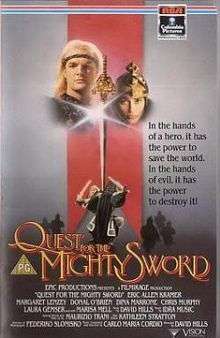Quest for the Mighty Sword
Quest for the Mighty Sword (also known as Ator III: The Hobgoblin, The Hobgoblin, or Troll 3) is a 1990 Italian fantasy adventure film directed by Joe D'Amato. It is the final film in the Ator film series.[2]
| Quest for the Mighty Sword | |
|---|---|
 British home video cover | |
| Directed by | Joe D'Amato |
| Produced by | Carlo Maria Cordio[1] |
| Screenplay by | Joe D'Amato[1] |
| Starring |
|
| Music by | Carlo Maria Cordio[1] |
| Cinematography | Joe D'Amato[1] |
| Edited by | Kathleen Stratton[1] |
Production company | Filmirage[2] |
Release date |
|
Running time | 94 minutes (United States)[3] |
| Country | Italy[1] |
Plot
Once upon a time, a god gave a mighty sword to the king of Aquiles to bring justice to his people. Now he wants it back – but the king gives his life rather than give up the sword. Goddess Dehamira, who spoke for him, is stripped of all her privileges and held in a circle of fire until a human arrives who's strong enough to free her. When prince Ator becomes 18, he gets the sword from the mean sorcerer gnome Grindl to free Dehamira and his people. On his journey, he has to fight against dragons and other fantastic figures.
Cast
- Eric Allan Kramer as The Son of Ator (as Eric Allen Kramer)
- Margaret Lenzey as Dehamira / DeJanira
- Dina Morrone as Sunn
- Marisa Mell as Nephele
- Laura Gemser as Grimilde
- Donald O'Brien as Gunther (as Donal O'Brien)
- Chris Murphy as Skiold
- Don Semeraro as Thorn-Grindel Hagen
Production
Actress Marisa Mell returned to the screen in this film after a five years absence.[4] The film re-used some of the goblin masks from Troll 2.[5]
Release
In the United States, Quest for the Mighty Sword was released direct-to-video on August 29, 1990.[1][6]
The film was also released as Ator III: The Hobgoblin, The Hobgoblin, and in Germany as Troll 3 (German release title)[5][7] D'Amato personally referred to the film as The Lord of Akili in a 1996 interview.[8]
Reception
John Stanley called the film "[a]nother pathetic entry in the Italian-produced Ator series".[9] Keith Bailey gave it a rating of one out of five stars, categorising it as "so bad it's good", with reservations due to some "dull moments". He wrote that the film's hero "manages to avoid spaghetti sauce lava when not fighting Siamese-twin robots and mucus-covered Godzilla clones in a quest that really doesn't seem to have any specific goal" and thus grants that "there are some hilariously bad sequences that will please fans of the abysmal".[10]
References
Footnotes
- Kinnard & Crnkovich 2017, p. 202.
- Kinnard & Crnkovich 2017, p. 203.
- Staff, Bowker Editorial (2001). "Bowker's Complete Video Directory 2001". Bowker. Retrieved 10 March 2019.
- Schneider, André (2013). Die Feuerblume: Über Marisa Mell und ihre Filme (in German). Books on Demand. p. 195. ISBN 9783732275151. Retrieved 10 March 2019.
- Collis, Clark (May 8, 2010). "The 'Troll' trilogy: Is this really the 'Best Worst' movie franchise of all time?". Entertainment Weekly. Retrieved June 7, 2019.
- Armstrong, Richard B.; Armstrong, Mary Willems (2015). Encyclopedia of Film Themes, Settings and Series. McFarland. ISBN 9781476612300. Retrieved 10 March 2019.
- Rushing 2016, p. 187.
- Palmerini & Mistretta 1996, p. 80.
- Stanley, John (2000). Creature Features: The Science Fiction, Fantasy, and Horror Movie Guide. Berkley Boulevard Books. p. 422. ISBN 9780425175170. Retrieved 10 March 2019.
- Bailey, Keith. "Quest for the Mighty Sword – review | cast and crew, movie star rating and where to watch film on TV and online". Radio Times. Retrieved 10 March 2019.
Sources
- Kinnard, Roy; Crnkovich, Tony (2017). Italian Sword and Sandal Films, 1908-1990. McFarland. ISBN 1476662916.CS1 maint: ref=harv (link)
- Palmerini, Luca M.; Mistretta, Gaetano (1996). Spaghetti Nightmares. Fantasma Books. ISBN 0963498274.CS1 maint: ref=harv (link)
- Rushing, Robert A. (2016). Descended from Hercules: Biopolitics and the Muscled Male Body on Screen. Indiana University Press. ISBN 0253022584.CS1 maint: ref=harv (link)
External links
- Quest for the Mighty Sword at AllMovie
- Quest for the Mighty Sword on IMDb
- Quest for the Mighty Sword at Rotten Tomatoes